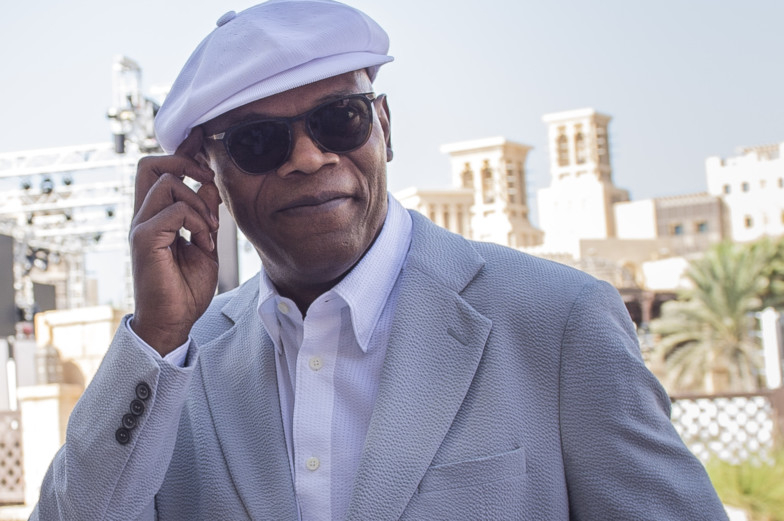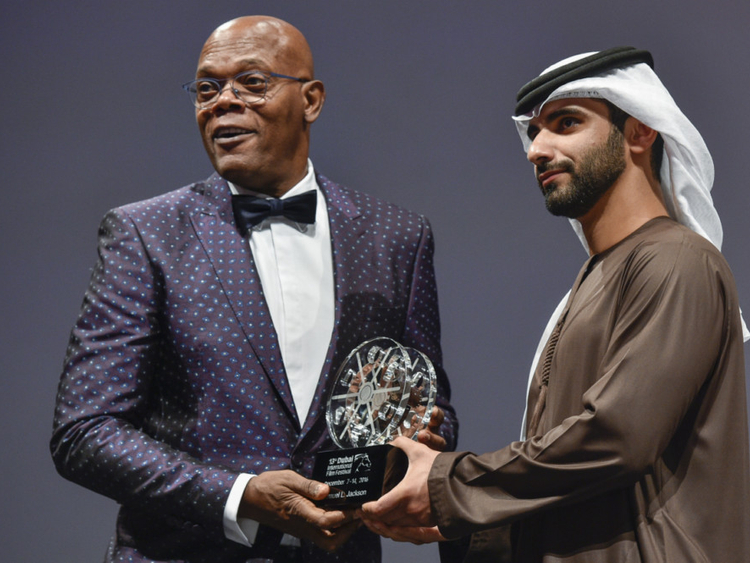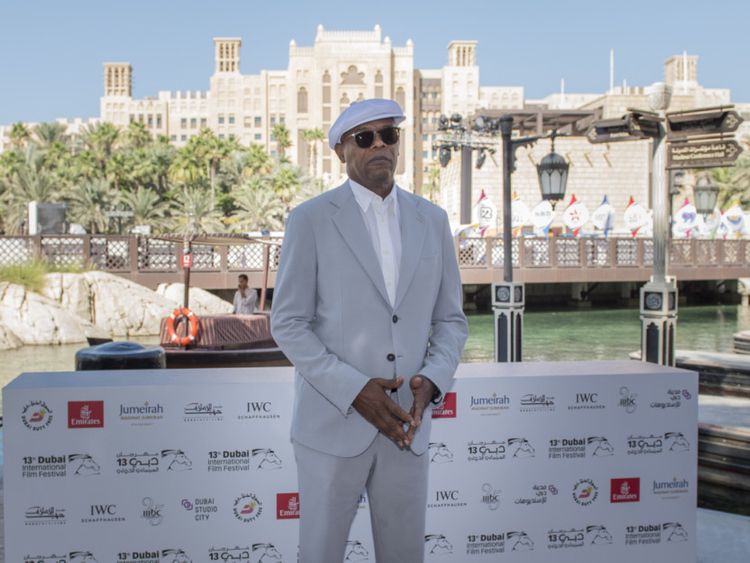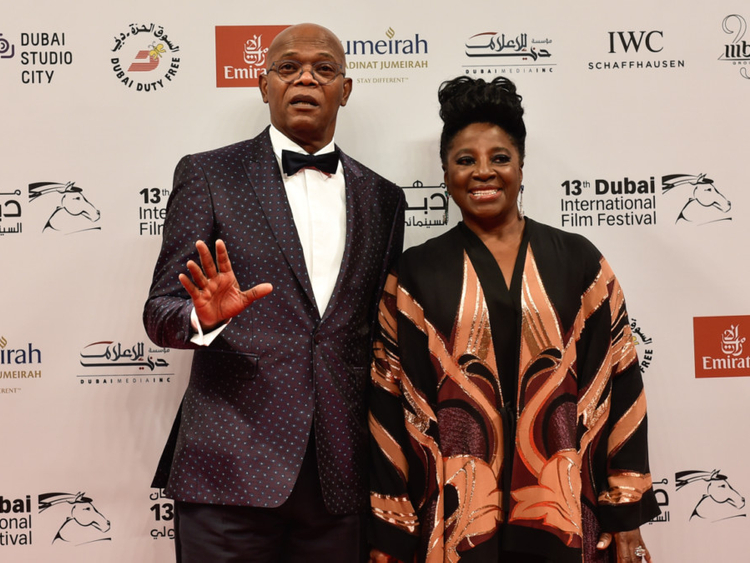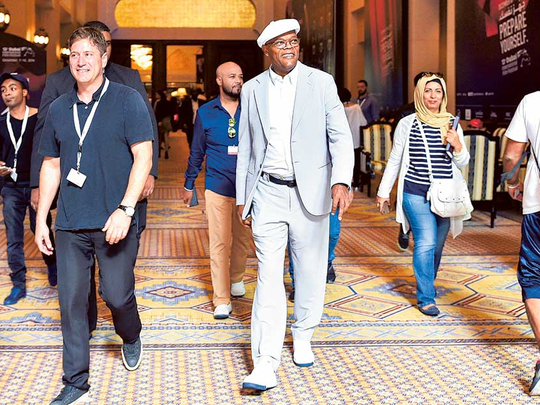
On the red carpet waiting for Samuel L. Jackson to arrive on December 7, there’s the usual amount of excitable chatter that comes with anticipating a face so familiar it may as well belong to a friend.
But he’s not a friend, of course. Jackson is a veteran of the big screen, attending the 13th Dubai International Film Festival to receive a Lifetime Achievement Award.
A journalist joked that we should ask him if there were any snakes on the plane ride over, a reference to one of several iconic films Jackson’s delivered in his career. Surprisingly, it’s not the most popular one.
Two days later, still in Dubai, Jackson sits down for a roundtable with a roomful of journalists crammed into one elongated sofa and several white chairs.
“This is bigger than a roundtable,” he observes wisely.
He takes a seat in a pristine grey suit, white sneakers and a matching white bonnet, with his vape in hand.
What’s the one line he’s said in a film that’s most often recited back to him?
“You know what they call a Quarter Pounder with cheese in France?” he responds without pause. It’s a line plastered on black market t-shirts everywhere, taken from the 1994 Quentin Tarantino cult classic Pulp Fiction. Jackson isn’t sick of it yet.
“There are actors who spend their whole careers and nobody can quote anything they’ve ever said,” he reasoned.
“People try to do the Ezekiel speech, but they’re not very good at it. I have lines from A Time to Kill, Star Wars — I say things and people want to repeat it. It’s always good. We always have a laugh in the middle of Quentin’s shoots. We always go, ‘Oh, t-shirt!’”
As for whether he’s ever ordered a Quarter Pounder with cheese in France he said: “I don’t tend to eat at McDonald’s”.
Nearly 68, Jackson is known for the sheer breadth and volume of his filmography — from Shaft and Black Snake Moan to the Marvel Cinematic Universe. More recently, he took on the role of Agent Gibbons in the upcoming Vin Diesel action flick, xXx: Return of Xander Cage.
“I play the same guy [in xXX] I play all the time. I go to them, I tell them what to do, I disappear, I come back and go, ‘Good job,’” he joked. He also played a role in Kong: Skull Island, set for a March release.
“They said, ‘This script is a King Kong script.’ And I didn’t even have to read it, because I’ve been watching King Kong since I was a kid. A lot of times when people say, ‘How do you choose your films?’ Sometimes I just choose films I would have gone to see when I was a kid,” he said.
Jackson grew up in Tennessee as an only child raised by his mother. He went to college in Atlanta and initially intended to take up marine biology as a career, but switched majors after he joined an acting group for extra credit.
Child of the ‘60s
Aside from acting, Jackson has been known for his activism and advocacy for human rights, and in 1968, after civil rights leader Martin Luther King Jr was assassinated, Jackson was an usher at his funeral.
“I guess I’m sort of known as being an outspoken political individual of sorts, so people pretty much know who I am and where I stand,” said Jackson.
“It’s totally about where I came from, what my values are, what I think the world should be in terms of equal rights of everyone,” he added. “All those things are formed because of the time I came up in America. I’m a child of the ‘60s.”
In the ‘90s, he began to make a name for himself with films such as Jungle Fever, Patriot Games and Pulp Fiction, which earned him his only Oscar nomination.
“Oscars are great, but I tell young actors, they don’t really move the comma on your cheque if you get one. I don’t have an Oscar, but I don’t think it would define my career if I never got one, you know — that people will go like, ‘Oh man, he did all this work, all these years and never got an Oscar. Wow, what a failure.’ I don’t think so,” he said.
Last year, the hashtag #OscarsSoWhite, started by April Reign, went viral on Twitter. It was a critique of the Academy’s choice to nominate less than a handful of people of colour in its top categories. This year, the Oscar buzz seems slightly more promising; Jackson mentioned Moonlight, Fences, Birth of a Nation and Loving as some examples of films being talked about.
“I think they went deep the other way this year. It’s not going to be an #OscarsSoWhite. But you never know — I mean, they haven’t voted yet,” said Jackson.
“Hopefully there will be a wider diversity of things to talk about, but they’re still talking about ‘Manchester by the Sea! Amazing! Brilliant! Ah!’ Ain’t no black people in that movie. Ain’t no Asian people. It is what it is. I don’t know how many black people are in Miss Sloane [Diff’s opening night film] or in Jackie O or whatever,” he said.
He added that the most important vote is the vote of people who go to the box office, an apt statement for the second-highest grossing movie star of all time, second only to voice actor Frank Welker.
Jackson, who stays grounded through the support of his wife and daughter, also spoke out in support of women’s voices in Hollywood, something he said had been restricted for a long time. He praised Diff for the abundance of woman-centric films included in its programme.
“Women see the world in a different way than men. We’re used to having our way or doing whatever. And even if we’re oppressed, we still find somebody to oppress, and it’s usually them,” he said.
When it comes to his own viewing habits, he looks far beyond what Hollywood has to offer, indulging in foreign films from the Turkish-French Mustang to Hindi titles.
“I like Bollywood movies actually. I can’t sing, but I can hang out,” said Jackson. “I spend an inordinate amount of time watching Korean, Chinese and Japanese films. Asian films more than anything else.”
For his own films, he studies his roles down to the most intricate details. In theatre, he learnt to create a biography for his characters, asking himself questions about their faith, education, family background and socioeconomic position in the world. It still fulfils him today in the same way it did on day one.
“It’s something I think about all the time and constantly get up and want to do. I’m always searching for projects and reading scripts, imagining myself inside that script or not inside it. I can throw it away or say, ‘Yeah, I’m interested in that,’” he said.



